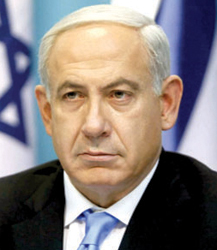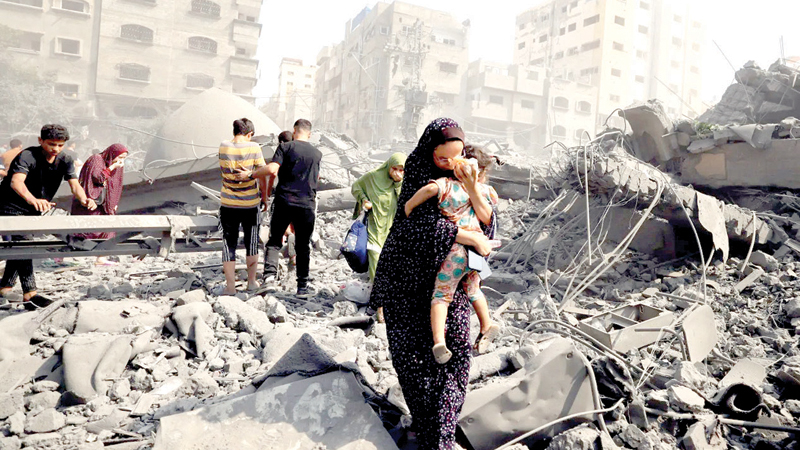 It was like a scene from a science fiction movie: flocks of armed Hamas-led Palestinian fighters para-gliding across the Israeli Occupying forces’ siege lines facing the congested urban slum that is the Gaza Strip, last Saturday, firing as they flew in. Gaza Strip is the most densely populated place on Earth, with more than 2.3 million people crammed into just 365 Sq Km, which is half the size of Singapore.
It was like a scene from a science fiction movie: flocks of armed Hamas-led Palestinian fighters para-gliding across the Israeli Occupying forces’ siege lines facing the congested urban slum that is the Gaza Strip, last Saturday, firing as they flew in. Gaza Strip is the most densely populated place on Earth, with more than 2.3 million people crammed into just 365 Sq Km, which is half the size of Singapore.
While the accompanying unprecedented salvos of thousands of rocket missiles overwhelmed Israel’s much-hyped ‘Iron Dome’ through sheer numbers, the daringly innovative paraglider assault succeeded purely by dint of its surprise element.
How the multiplicity of intelligence agencies including Shin Bet and Mossad operating inside the Strip did not notice this scale of accumulation of paragliders and rocket missiles and launchers is anyone’s guess. The world’s many rebel movements, their enemy intelligence agencies as well as arms dealers must all be now very busy assessing this military action by Palestinian militant movements that have resisted the Israeli Occupation since 1947.
Israel’s current extreme Right-wing hawkish Government now extracts brutal revenge – a revenge maximised by the compulsions of political survival – for the Hamas-led Palestinian Resistance’s bloody but brief attack last weekend. Israel’s Western allies now stubbornly brandish their military might, as they must, in order to sustain their control over the geopolitics of West Asia, their most contested borderland.
The rest of the world watches in growing horror. Some in the world community, the Arabs and Moslems especially, and, all nations of West Asia, see this as the latest blood-letting in Israel’s 70+ years’ of forcible occupation. The older generations of the entire non-Western rest of the world see this as a tragic leftover from their youth under Western pre-eminence.
The two billion youth around the world born in the 21st Century do not know the history at all, nor of the current complexities. But they are vividly informed, thanks to digital communications, of the violence right down to its micro tragedies and constant spectacle of physical destruction. Even if they do not know history and are unaware of the harsh realities and uncertainties of daily life in the Gaza Strip, the world’s digital communications consumers are constantly living parallel to the virtual world of online, real-time Gaza War.

Israeli Prime Minister Benjamin Netanyahu
Unlike in the pre-Internet era, the world is not dependent on a few Western-controlled or Western-loyal centralised news industry hubs. Today it is no longer packaged and periodic news bulletins.
Today’s digital multiverse enables that parallel life of digitally shared daily experience: us in Colombo or Ampara or Kilinochchi and the Palestinians and Israelis there in Gaza, Tel Aviv, Ramallah and Jenin.
Today the whole world is compelled to watch the build up of vast Israeli firepower after having watched that brief episode of shock attack by Occupation resistance forces sallying out of long-besieged Gaza. Already, the graphic imagery and sound of explosions and human agony during the initial Gazan attack on surrounding Israeli positions and Israeli neighbourhoods has been replaced by the graphic imagery and soundbites of Israeli aerial bombing and artillery shelling of tiny Gaza.
Thanks to the Internet and digital recording, the entire world will be well informed (relatively speaking) of the extreme violence of conventional military heavy weapons. Lighter sounds of infantry weapon fire are already being replaced by the shattering booms and ominous thud of heavy bombs and shells designed to instantaneously destroy whole buildings and penetrate underground.
Monopoly
In this new, multi-hub structure of global communications, there is no longer a monopoly of narrative by any one side. More significantly, the citizens’ communicational power and information gathering capacity is enabling more autonomous individual and community perception of human actions and predicaments across the globe.
Just as we lived through multiple pandemic experiences during the Covid pandemic and also live through various natural disasters with shared vivid depictions and traumatised and traumatising human witnessing, we are now living through the digitally shared agony of Gaza. As this shared agony itself explodes across the globe, how will this affect the geopolitics of the Israeli-Palestinian conflict?
And the agony is not merely information-based. Already, at least one Sri Lankan has died. Many more people from other countries have become casualties of this latest conflagration.
If the scale of the conflict pushes countries sympathising with Palestine to begin supportive actions in, for example, the economic and political spheres, sudden and negative changes in markets, especially of human essentials like food and fuel, will affect billions.
Can those trying to pursue militaristic responses to the Palestinian resistance persist? Can the West continue to back the current Benjamin “Bibi” Netanyahu coalition regime’s current hardline, election-oriented “solution”?
The continued under-writing of the Likud-led coalition governance by the West will be dependent on two factors. Firstly, the possible – if not desirable – adaptation or abandoning of old, post-World War II, colonial-type geopolitics that saw the forcible installation of a European colony, Israel, at the centre of Europe’s vulnerable underbelly in the Eastern Mediterranean littoral. The European colonial powers in full retreat from their colonial possessions in general, thought to install one last outpost in what was becoming a most valuable region – valuable because of the new (at the time, post-War) dependence on fossil fuels.
Even if South Africa’s White dominance experiment failed in the face of overwhelming popular Black African resistance, the sheer importance of West Asian mineral resources was such that the West persisted with Israel. Not only was Israel set up despite the flagrant ethnic cleansing of the indigenous population of Palestine (nearly 750,000 Palestinians were pushed out from their own lands), but the West has continued to grimly persist with the underwriting of Israel even as the United Nations (UN) itself has labelled Israel as an Apartheid State, just as South Africa once was.
It remains to be seen whether the ongoing new perceptions of geopolitical realities by Washington and Brussels (EU) will result in a new caution and a moderation of the current pro-Israel cacophony.
Complex
The second factor is the growing divergence of much of world opinion from the old, Western-led, binary, good-bad, liberal-illiberal, narrative, to a far more varied complex of narratives deriving from the vast new inter-connectivity of human migrations and virtually built large scale community identities. These new connectivities result in socially coordinated citizens actions in the electoral arena and in economic life.
Migrant labour will shift away from rich but unstable Israel. Large consumer markets may voluntarily boycott Israeli products – even if Governments persist in buying Israeli weapons and digital security technology.
A possible third factor might be a renewed domestic electoral resistance to the current Zionist repressive governance. More Israelis may wish to reconsider that role as a frontier colony of the West. If Israel enables a secure and stable Palestinian state to emerge, what is to stop all the West Asian neighbours wanting to trade with Israel? In a peaceful West Asia, both Lebanon and Israel could be new economic hubs, supported as they are by extensive agricultural hinterlands that the desert-based Gulf States are not.
Certainly, in the medieval era, the Crusades were the first extra regional territorial incursion by Europe after the ancient Greek and Roman Empires. And it was the same perception of the Eastern Mediterranean seaboard being an access point to Asia.
So large military organisations of crusader armies were formed and began wielding both massive political and military power. The most prominent were the Knights Templars and the Knights of St. John. That is the origin of modern Europe’s approach to the Eastern Mediterranean.
Likewise, on the far side of the Atlantic, a significant White Conservative electorate in the USA still nurtures fantasies of White Supremacy, a supremacy of cowboy, Wild West style.
A smaller Fundamentalist Christian minority in the US has visions of Israel becoming the site of Armageddon, the Biblical final battle in which Jesus Christ defeats Satan and takes up all ‘saved’ Christians to Heaven while the rest of humanity burns in hell. It is likely that some of these Fundamentalists are already hoping that a bloody Israeli offensive will provoke a new World War that will bring about Armageddon and their entry to eternal life.
Western underwriting of Israel’s current hardline Zionism is what precipitates Israel’s current path. In that sense, the Israelis too are victims in the larger neo-colonial framework. This persistence by the West of pushing Israel into confrontation with its regional neighbours and its own indigenous population, is thus a betrayal of the original European declaration that provided the Jews with a safe place to live.






